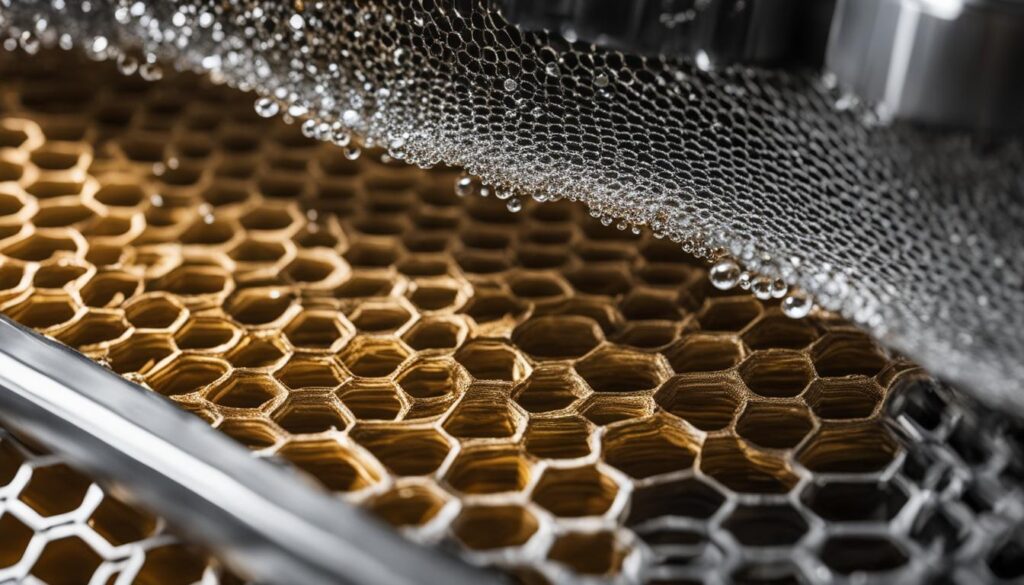The European Union launched a prize in 2015 to find an affordable, sustainable, and innovative solution to reduce particulate matter in urban areas. Corning European Technology Center won the prize for adapting their existing technology for use in open air. The honeycomb design and ceramic materials used in the filter allow it to capture particulate matter, leaving clean air to be expelled. The material used in the filter, cordierite, is made from natural inorganic materials and has a high melting point. The filter has the potential to deliver 3.6 million cubic meters of purified air per day.
Key Takeaways:
- Honeycomb filters are an efficient and sustainable solution for air filtration.
- The honeycomb design and ceramic materials capture particulate matter and improve air quality.
- Cordierite, the material used in the filter, is made from natural inorganic materials.
- Honeycomb filters have the potential to deliver large volumes of purified air per day.
- The European Union recognized the importance of finding innovative air filtration solutions.
The Impact of Air Pollution on Human Health
Air pollution poses a significant threat to human health, as recognized by the World Health Organization (WHO). The presence of particulate matter in the air, including fine and ultrafine particles, has been linked to various adverse health effects. These particles can penetrate deep into the respiratory system, causing respiratory and cardiovascular diseases, such as asthma, bronchitis, and even heart attacks.
Air pollution is a pressing issue in Europe, with high levels of particulate matter being recorded in many urban areas. The exposure to these pollutants has been associated with increased mortality rates and reduced life expectancy. It is crucial to address this problem and improve air quality to safeguard the well-being of the population.
Efforts to combat air pollution have led to the development of innovative solutions such as honeycomb filters. These filters aim to capture and remove particulate matter from the air, thereby reducing the concentration of harmful pollutants. By improving air quality, honeycomb filters contribute to safeguarding human health and mitigating the detrimental impact of air pollution.
“Air pollution is currently the biggest environmental risk to human health.” – World Health Organization
In conclusion, air pollution poses a significant risk to human health, with particulate matter being a major contributor to this issue. The implementation of honeycomb filters can play a crucial role in reducing air pollution and improving air quality, ultimately protecting the health and well-being of individuals.
The Honeycomb Filter Technology
The honeycomb filter technology is a breakthrough innovation in filtration systems. Its unique honeycomb design and the use of ceramic materials make it a highly efficient and effective solution for capturing and removing particulate matter.
The honeycomb structure of the filter provides a large filtration area in a compact space. This allows for maximum exposure to the air being filtered, ensuring thorough and efficient removal of particles. The ceramic materials used in the filter are porous, allowing them to capture even finer particles that may be present in the air.
One of the key materials used in the honeycomb filter is cordierite. Cordierite is made from natural inorganic materials and has a high melting point, making it durable and long-lasting. The combination of the honeycomb design and ceramic materials results in a filtration system that can effectively cleanse the air and improve overall air quality.
Honeycomb Filter Technology in Action
“The honeycomb filter technology has revolutionized air and water filtration systems. Its ability to remove particulate matter and provide cleaner air and water is truly remarkable.”
The honeycomb filter technology has a wide range of applications in various industries. It is commonly used in automotive settings to capture vehicle emissions and improve air quality. In industrial environments, honeycomb filters can be used to filter out pollutants from exhaust gases, ensuring cleaner emissions.
In addition to air filtration, honeycomb filters can also be used for water treatment. They are capable of removing chemical, microbial, and physical contaminants from water, making it safer for consumption. This technology plays a crucial role in providing universal access to safe drinking water, as outlined in the United Nations Sustainable Development Goals.
The Honeycomb Filter Technology: Key Advantages
- Efficient filtration system
- Compact design with a large filtration area
- Effective removal of particulate matter
- Durable and long-lasting
- Wide range of applications
- Contribution to environmental sustainability
The honeycomb filter technology offers a range of advantages, including its efficient filtration capabilities, compact design, and durability. It is a versatile solution that can be used in various industries and settings to improve air and water quality. With its positive impact on environmental sustainability, the honeycomb filter technology is set to play a significant role in the future of filtration systems.
Applications of Honeycomb Filters
Honeycomb filters have a wide range of applications in various industries. They are commonly used in automotive, industrial, and air filtration systems to improve air quality and reduce emissions.
Honeycomb Air Filter
The honeycomb air filter is designed to remove particles and contaminants from the air, providing cleaner and healthier indoor environments. It is commonly used in HVAC systems, air purifiers, and ventilation systems.
Automotive Honeycomb Filter
The automotive industry utilizes honeycomb filters to capture and reduce vehicle emissions, improving air quality and meeting environmental regulations. These filters play a crucial role in reducing pollutants and harmful particles released into the atmosphere.
Industrial Honeycomb Filter
In industrial settings, honeycomb filters are used to filter out pollutants and contaminants from exhaust gases. They are widely employed in industries such as manufacturing, chemical processing, and power generation to minimize air pollution and comply with emission standards.
Honeycomb Catalyst Filter
Honeycomb catalyst filters are specifically designed to remove harmful gases and pollutants from industrial processes. They are commonly used in exhaust systems and catalytic converters, playing a vital role in reducing emissions and promoting sustainable manufacturing practices.
Honeycomb Diesel Particulate Filter
Honeycomb diesel particulate filters are engineered to reduce emissions from diesel engines, particularly fine particulate matter. These filters help mitigate the environmental impact of diesel vehicles and improve air quality in urban areas.
Overall, honeycomb filters offer a versatile and effective solution for various filtration needs across different industries. By capturing and removing particles, pollutants, and contaminants, these filters not only improve air quality but also contribute to sustainable and environmentally friendly practices.
Benefits of Honeycomb Filters
Honeycomb filters offer several key benefits that make them a highly effective solution for air filtration. Firstly, they provide efficient filtration, effectively capturing particulate matter and improving overall air quality. This is crucial in reducing the concentration of harmful pollutants in urban areas and promoting a healthier environment.
Furthermore, honeycomb filters are sustainable and compatible with the environment. They are made from natural inorganic materials, such as cordierite, which has a high melting point and is derived from sustainable sources. The use of ceramic materials and the honeycomb design allows for long-lasting durability and effectiveness, minimizing the need for frequent replacements.
In addition to their efficiency and sustainability, honeycomb filters are also affordable. This makes them a cost-effective solution for air filtration, allowing for widespread implementation and accessibility. Their affordability, combined with their other benefits, makes honeycomb filters a highly attractive option for various applications, from automotive to industrial and air filtration.
Overall, honeycomb filters offer a powerful combination of efficient filtration, sustainability, compatibility with the environment, and affordability. They play a crucial role in improving air quality and promoting a healthier living environment for all.
Self-Cleaning Honeycomb Filter Machines
Russell Finex offers a revolutionary solution to filter impurities from honeycomb filters with their self-cleaning filter machines. These machines utilize a unique wiping system and reusable filter media to effectively remove pollen granules, bee parts, and solid wax particles from the honeycomb. This self-cleaning feature not only reduces product wastage and disposal costs but also significantly improves productivity.
Designed to be totally enclosed, the self-cleaning honeycomb filter machines prioritize operator safety and environmental protection. The enclosed design ensures that operators are shielded from any potential exposure to contaminants, while also preventing the release of impurities into the surrounding environment. With the growing emphasis on workplace safety and sustainability, these machines offer a reliable and efficient solution for honeycomb filter maintenance.
Achieve Maximum Efficiency with Russell Eco Filter
One of the key advantages of the self-cleaning honeycomb filter machines is the use of Russell Eco Filter, a reusable filter media. This innovative filter media extends the lifespan of the honeycomb filters, minimizing the need for frequent filter replacements. By reducing both material consumption and filter cost, the Russell Eco Filter contributes to the overall affordability and sustainability of honeycomb filter systems.
“The self-cleaning honeycomb filter machines from Russell Finex offer a game-changing solution for efficient and cost-effective honeycomb filter maintenance. With their unique wiping system and reusable filter media, these machines ensure the continuous removal of impurities, improving productivity and reducing waste. The use of Russell Eco Filter further enhances the sustainability and affordability of honeycomb filter systems.”
Whether used in automotive, industrial, or air filtration applications, the self-cleaning honeycomb filter machines from Russell Finex provide a reliable and environmentally friendly solution. With their self-cleaning capabilities and reusable filter media, these machines contribute to the efficient maintenance of honeycomb filters, ensuring the consistent delivery of clean air and improved filtration performance.
| Advantages of Self-Cleaning Honeycomb Filter Machines | Russell Eco Filter Benefits |
|---|---|
| Reduces product wastage and disposal costs | Extends the lifespan of honeycomb filters |
| Improves productivity and efficiency | Minimizes the need for frequent filter replacements |
| Ensures operator safety and environmental protection | Reduces material consumption and filter cost |
| Compatible with various applications | Enhances the sustainability and affordability of honeycomb filter systems |

The Efficiency of Honeycomb Filters for Water Treatment
Honeycomb filters offer a versatile and efficient solution for water treatment, addressing the challenges of water pollution caused by chemical, microbial, and physical contaminants. With the increasing global concern for safe drinking water, honeycomb filters play a crucial role in ensuring water quality and providing access to clean and healthy water sources.
Water pollution is a significant issue that affects the safety and availability of drinking water. Chemical contaminants, such as heavy metals and pesticides, can pose serious health risks when consumed. Microbial contaminants, including bacteria and viruses, can lead to waterborne diseases. Physical contamination, such as sediment and suspended particles, can impact the appearance and taste of water. Honeycomb filters are designed to effectively remove these contaminants, providing safe and potable drinking water.
By utilizing the honeycomb design and ceramic materials, honeycomb filters offer an efficient filtration process. The honeycomb structure provides a large surface area for filtration, allowing for enhanced contact between the water and the filter media. The ceramic material used in the filter media is porous, enabling the capture and retention of fine particles. This combination of design and material ensures efficient removal of chemical, microbial, and physical contaminants, resulting in clean and safe drinking water.
Furthermore, honeycomb filters are a sustainable and cost-effective solution for water treatment. They can be easily integrated into existing water treatment systems, reducing the need for extensive infrastructure modifications. The durable and long-lasting nature of honeycomb filters also minimizes maintenance and replacement costs. With their ability to remove a wide range of contaminants and their environmental compatibility, honeycomb filters offer an efficient and sustainable approach to water treatment.
Summary:
Honeycomb filters are efficient and versatile in addressing water pollution issues caused by chemical, microbial, and physical contaminants. Their honeycomb design and ceramic materials enable efficient filtration, ensuring the removal of harmful substances from water sources. In addition to their effectiveness, honeycomb filters offer a sustainable and cost-effective solution for water treatment, making them a valuable tool in providing safe and potable drinking water.
Universal Access to Safe Drinking Water
Ensuring universal access to safe drinking water is a fundamental goal outlined in the United Nations Sustainable Development Goals. While progress has been made through initiatives like the Millennium Development Goals, achieving universal access to safe drinking water remains a challenge. The quality of water and the protection of water-related ecosystems play a vital role in this endeavor.
Efforts to improve water quality are crucial for providing safe drinking water to everyone. Water pollution caused by chemical contaminants, microbial contaminants, and physical contamination poses significant threats to human health. By implementing effective filtration systems like honeycomb filters and Fe0 filters, we can remove these contaminants and ensure the availability of safe drinking water.
To achieve universal access to safe drinking water, it is essential to prioritize the protection of water-related ecosystems. These ecosystems, including rivers, lakes, and wetlands, provide vital services, such as natural filtration and water storage. By preserving and restoring these ecosystems, we can enhance the quality and availability of water resources, contributing to our goal of universal access to safe drinking water.
| Key Points | |
|---|---|
| Universal Access | Ensuring safe drinking water for all individuals, regardless of geographical location or socio-economic status. |
| United Nations Sustainable Development Goals | A set of goals aimed at addressing global challenges, including access to safe drinking water. |
| Water Quality | The importance of clean and uncontaminated water in safeguarding human health. |
| Water-Related Ecosystems | The role of ecosystems in providing natural filtration and maintaining water resources. |
Fe0 Filters for Decentralized Safe Drinking Water
Fe0 filters, based on iron corrosion, are an innovative technology that offers a decentralized and cost-effective solution for safe drinking water provision. These filters utilize the intrinsic reactivity of Fe0 materials to effectively remove various contaminants from water, including arsenic. The design and operational parameters of Fe0 filters play a crucial role in their efficiency and success, making it important to consider the principles of corrosion science and iron corrosion.
Studies have shown that Fe0 filters are highly efficient in removing arsenic, a toxic species present in many water sources around the world. The process involves oxidizing arsenite (As[III]) to arsenate (As[V]) and increasing the iron concentration in the water. By choosing the appropriate Fe0 materials and optimizing the system design, Fe0 filters can achieve efficient arsenic removal, ensuring the provision of clean and safe drinking water.
In order to maximize the efficiency of Fe0 filters, it is important to consider the operational conditions. Factors such as pH, oxygen levels, and water flow velocity can impact the performance of these filters. Additionally, the variability in operational parameters makes it challenging to determine universal efficiency in Fe0 filter systems. However, through careful monitoring and optimization of these parameters, Fe0 filters can be highly effective in removing contaminants and providing decentralized safe drinking water.
Table: Comparative Analysis of Fe0 Filters and Conventional Water Treatment Methods
| Filter Type | Advantages | Disadvantages |
|---|---|---|
| Fe0 Filters |
|
|
| Conventional Water Treatment Methods |
|
|
Fundamental Aspects of Fe0 Filters

Arsenic removal is a complex process that relies on the use of Fe0 filters. These filters are designed to oxidize arsenite to arsenate and increase the iron concentration in water, effectively removing arsenic contaminants. However, the efficiency of Fe0 filters for arsenic removal can be influenced by various operational conditions.
Oxidizing agents play a crucial role in the efficiency of Fe0 filtration systems. The choice of oxidizing agent can impact the rate of arsenic removal and the overall performance of the filter. Common oxidizing agents used in Fe0 filters include oxygen, hydrogen peroxide, and permanganate. The presence of oxidizing agents in the water can facilitate the oxidation of arsenite and enhance the effectiveness of the filter.
System design parameters also play a significant role in the efficiency of Fe0 filters. Factors such as pH, oxygen levels, and water flow velocity can affect the performance of the filter. Maintaining the appropriate pH level is crucial, as it influences the speciation of arsenic and the reactivity of Fe0. Adequate oxygen levels are necessary to sustain the oxidation reactions, while the water flow velocity affects the contact time between the water and the Fe0 material.
In summary, the efficient removal of arsenic using Fe0 filters requires careful consideration of various factors. The selection of oxidizing agents, system design parameters, and Fe0 material characteristics all contribute to the overall performance of the filter. By optimizing these aspects, Fe0 filters can be effectively utilized for arsenic removal in water treatment processes.
Efficiency and Variability of Fe0 Filters
Fe0 filters have shown great potential in removing contaminants, particularly arsenic, from water. However, the efficiency of these filters can vary depending on various operational parameters and system design. Understanding these factors is crucial to optimizing the performance of Fe0 filter systems.
The size of the columns used in Fe0 filters can impact their efficiency. Larger columns provide a larger surface area for the reaction between Fe0 and the contaminants, resulting in higher removal rates. Additionally, the type of Fe0 material used can also affect filter efficiency. Different materials have different reactivity towards contaminants, so selecting the appropriate material is essential.
The size and elemental composition of Fe0 particles can also influence the performance of Fe0 filters. Smaller particles have a larger surface area, enabling more contact with contaminants, while the elemental composition can affect the reactivity of Fe0 towards specific contaminants. Furthermore, other operational parameters such as pH value, flow rate, and duration of the experiments should also be carefully considered to optimize the removal efficiency.
Overall, achieving consistent and high efficiency in Fe0 filter systems requires careful consideration of various operational parameters and system design. By understanding the impact of these factors, researchers and engineers can optimize the performance of Fe0 filters, ensuring effective removal of contaminants and providing safe drinking water to communities in need.
| Operational Parameters | Impact on Fe0 Filter Efficiency |
|---|---|
| Column size | Influences surface area and contact between Fe0 and contaminants |
| Type of Fe0 material | Different materials have different reactivity towards contaminants |
| Fe0 particle size | Smaller particles provide a larger surface area for contact |
| Fe0 elemental composition | Affects the reactivity of Fe0 towards specific contaminants |
| pH value | pH can affect the solubility and speciation of contaminants |
| Flow rate | Affects the contact time between Fe0 and contaminants |
| Duration of experiments | Longer durations allow for more thorough removal of contaminants |
Conclusion
Honeycomb filters are a game-changer in the world of sustainable filtration solutions. With their efficient design and use of ceramic materials, these filters excel in capturing particulate matter and improving air and water quality. The honeycomb structure provides a large filtration area in a compact space, while the ceramic materials have the ability to trap even the finest particles, ensuring clean and purified air or water.
In addition to their filtration capabilities, honeycomb filters offer several other benefits. They are sustainable, made from natural inorganic materials, and compatible with the environment. Not only are they effective in removing contaminants, but they also have a long lifespan, making them a cost-effective solution in the long run.
Honeycomb filters have a wide range of applications, from automotive and industrial use to air and water filtration. They play a crucial role in reducing air pollution and providing safe drinking water. The self-cleaning feature of honeycomb filter machines further enhances their efficiency and productivity, minimizing wastage and reducing disposal costs.
As the world becomes more conscious of the need for environmental protection and human health, honeycomb filters will continue to be at the forefront of sustainable filtration solutions. Their efficient performance, affordability, and compatibility with the environment make them an ideal choice for various filtration needs.
FAQ
What is a honeycomb filter?
A honeycomb filter is a filtration system that uses a honeycomb design and ceramic materials to capture and remove particulate matter.
What are the applications of honeycomb filters?
Honeycomb filters can be used in automotive, industrial, and air filtration applications to capture vehicle emissions, filter pollutants from exhaust gases, and improve indoor air quality.
How do honeycomb filters improve air quality?
Honeycomb filters capture particulate matter, such as fine and ultrafine particles, which can have a detrimental effect on health, thereby providing cleaner air.
Are honeycomb filters sustainable?
Yes, honeycomb filters are made from natural inorganic materials and are designed to be durable, making them a sustainable solution for air filtration.
Are honeycomb filters affordable?
Yes, honeycomb filters are affordable, making them a cost-effective solution for air and water filtration.
How do self-cleaning honeycomb filter machines work?
Self-cleaning honeycomb filter machines use a unique wiping system and reusable filter media to remove impurities from honeycomb, reducing product wastage and disposal costs.
Can honeycomb filters be used for water treatment?
Yes, honeycomb filters can be used for water treatment to remove chemical, microbial, and physical contaminants and ensure safe drinking water.
What is Fe0 filtration?
Fe0 filtration is a technology that uses iron corrosion to remove contaminants from water, including arsenic.
How efficient are Fe0 filters for arsenic removal?
The efficiency of Fe0 filters for arsenic removal can vary depending on operational parameters such as pH, oxygen levels, and water flow velocity.
What is the goal of universal access to safe drinking water?
The goal of universal access to safe drinking water is to ensure that everyone has access to clean and safe drinking water, as outlined in the United Nations Sustainable Development Goals.




